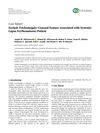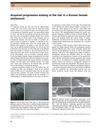 1 citations,
October 2014 in “Paediatrics and Child Health”
1 citations,
October 2014 in “Paediatrics and Child Health” The document concludes that proper diagnosis and management of hair loss in children require a detailed examination and understanding of various hair disorders.
 1 citations,
January 2013 in “Elsevier eBooks”
1 citations,
January 2013 in “Elsevier eBooks” The document reviews various hair and nail disorders, their causes, and treatments, emphasizing the need for proper diagnosis and the link between nail changes and systemic diseases.
 1 citations,
January 2011 in “Springer eBooks”
1 citations,
January 2011 in “Springer eBooks” Histone demethylases play a key role in the development of many diseases and may be targets for treatment.
 October 2024 in “Andrology”
October 2024 in “Andrology” Paternal drug exposure can harm fertility, pregnancy outcomes, and offspring health, with specific drugs linked to various reproductive issues.
 October 2024 in “Journal of the Endocrine Society”
October 2024 in “Journal of the Endocrine Society” Early detection of ovarian steroid cell tumors is crucial to prevent lasting symptoms.
 July 2024 in “Journal of Dermatological Treatment”
July 2024 in “Journal of Dermatological Treatment” Botanical extracts and Minoxidil improved hair condition in a boy with a genetic disorder.
 May 2024 in “CRC Press eBooks”
May 2024 in “CRC Press eBooks” Children's hair loss can have various causes, including infections, autoimmune issues, physical stress, nutritional problems, and genetic factors.

A 12-year-old girl was misdiagnosed with alopecia areata but actually had a nevus sebaceus with a genetic mutation.
 August 2022 in “Case reports in medicine”
August 2022 in “Case reports in medicine” Long eyelashes in a patient were an unusual sign of systemic lupus erythematosus.
November 2021 in “CRC Press eBooks” Hair color is determined by melanin and can be affected by genetic conditions like albinism.
January 2019 in “Elsevier eBooks” Understanding stem cell environments is key to developing treatments for various diseases and injuries.
June 2018 in “Journal of the American Veterinary Medical Association” Three related Persian cats have a rare, likely hereditary skin condition causing hair loss and poor coat quality, with limited treatment options.
 February 2014 in “Medicine - Programa De Formación Médica Continuada Acreditado”
February 2014 in “Medicine - Programa De Formación Médica Continuada Acreditado” The document concludes that non-scarring alopecias can be reversed, but scarring alopecias cause permanent hair loss.

Metformin is safe in early pregnancy for women with PCOS and may reduce certain risks.
 January 2013 in “International Journal of Trichology”
January 2013 in “International Journal of Trichology” A new mutation in the TRPS1 gene was found in a Ukrainian girl with Trichorhinophalangeal syndrome type I.
 March 2012 in “Journal of The American Academy of Dermatology”
March 2012 in “Journal of The American Academy of Dermatology” Temporal triangular alopecia usually starts in early childhood and treatment with Minoxidil has limited effectiveness.

A man's scalp hair loss was due to a combined melanocytic nevus and alopecia areata, suggesting a possible link between the two conditions.
 September 2005 in “Clinics in Plastic Surgery”
September 2005 in “Clinics in Plastic Surgery” The document provides a comprehensive index of medical and surgical topics, including hair removal, hair restoration, and various treatments for injuries and conditions.
 August 1998 in “Dermatologic Surgery”
August 1998 in “Dermatologic Surgery” Follicular unit hair transplantation is better than Miniflap Hair Restoration due to less scarring and more natural results.
September 1993 in “PubMed” The document concludes that antiandrogenic drugs like cyproterone acetate and spironolactone are effective but not permanent treatments for skin-related androgenization in women.
 159 citations,
March 2014 in “Journal of The American Academy of Dermatology”
159 citations,
March 2014 in “Journal of The American Academy of Dermatology” Some skin medications are safe during pregnancy and breastfeeding, but others can harm the baby and should be avoided.
 1 citations,
October 2012 in “The Journal of Dermatology”
1 citations,
October 2012 in “The Journal of Dermatology” A Korean girl developed kinky hair without known cause or effective treatment.
 June 2020 in “bioRxiv (Cold Spring Harbor Laboratory)”
June 2020 in “bioRxiv (Cold Spring Harbor Laboratory)” The HoxC gene cluster and its enhancers are essential for developing hair and nails in mammals.
 September 2018 in “Plastic and reconstructive surgery. Global open”
September 2018 in “Plastic and reconstructive surgery. Global open” A new earlobe repair method using cartilage grafts showed high satisfaction and no re-splitting.
 29 citations,
March 2019 in “British Journal of Dermatology”
29 citations,
March 2019 in “British Journal of Dermatology” Acne is significantly influenced by genetics, and understanding its genetic basis could lead to better, targeted treatments.
 24 citations,
January 2013 in “Indian Journal of Dermatology, Venereology and Leprology”
24 citations,
January 2013 in “Indian Journal of Dermatology, Venereology and Leprology” Hormonal treatment is effective for women with acne not helped by usual treatments, especially if they have hormonal imbalances.
12 citations,
October 1996 in “Dermatologic clinics” Advances in genetics may lead to targeted treatments for hair disorders.
 7 citations,
December 2014 in “Gynecological Endocrinology”
7 citations,
December 2014 in “Gynecological Endocrinology” LC-MS/MS is more reliable than immunoassays for diagnosing 21-hydroxylase deficiency.
 3 citations,
February 2018 in “Journal of evolution of medical and dental sciences”
3 citations,
February 2018 in “Journal of evolution of medical and dental sciences” Some ovarian tumors can cause masculinization, and it's important to check for various causes when this symptom is present.
 1 citations,
January 2014 in “Springer eBooks”
1 citations,
January 2014 in “Springer eBooks” Adult acne is more common in women, often linked to hormones, and can be harder to treat.

























